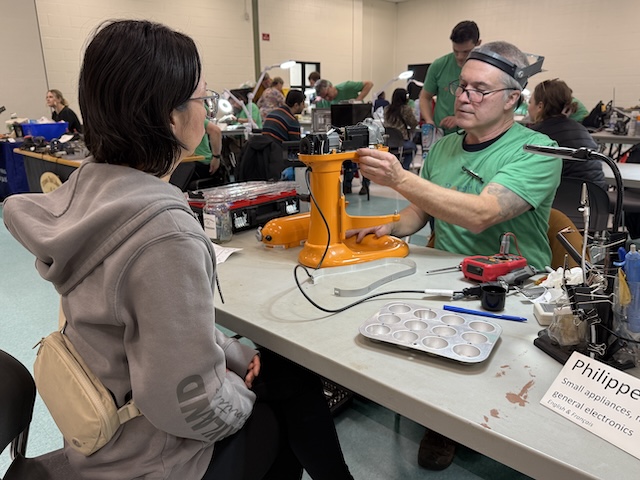Advocacy groups are urging residents and Ottawa city hall to focus on strengthening the local circular economy — including the voluntary repair and recycling service provided by the Ottawa Tool Library — as part of the community response to the on-going U.S. trade war with Canada.
The U.S. has imposed tariffs on many Canadian exports, including vehicles, steel and aluminum, most recently on Wednesday in President Donald Trump’s “Liberation Day.”
Since February, the U.S. government has confusingly retracted, paused, reimposed and threatened to extend tariffs to other industries.
The anti-Canadian trade policies and ongoing uncertainty around U.S. actions have prompted retaliation by Canada, which has announced various countermeasures in response to the initial round of tariffs.
The trade war is having a significant impact on this country’s economy, workers and communities.
In response to all the chaos, Canadians are now not only trying to shop locally, but also regulating overconsumption. One way is by strengthening what is called the circular economy.
Advocacy groups want the City of Ottawa to stand firm in the face of the challenge posed by Trump and his protectionist trade policies.
On Feb. 27, the Peoples Official Plan Coalition (POP) — including groups such as Ecology Ottawa and Just Food — wrote to Ottawa Mayor Mark Sutcliffe with suggestions about what the city should focus on while battling U.S. tariffs.
POP listed local food sovereignty, local energy sovereignty and the local circular economy as three priority areas.
Working on a swift transition from a “linear” economy to a circular economy would reduce waste and reintegrate materials into a new supply chain, lessening the amount of stuff ending up in landfills, the POP explained.
“The city can support a circular economy for all city operations and buildings by reducing waste generation and collection in-house, by enhancing recycling and by developing a pro-active green procurement strategy by for example banning all single use plastics, requiring recyclable packaging in all product purchasing and pursuing green construction waste reduction strategies,” the POP stated.
Reusing and repurposing items would prevent people from making unnecessary purchases from American companies, the POP coalition urged.
The city has announced measures in line with many POP recommendations and created an online resource detailing “how residents and business owners can help support Canadian and local producers and businesses as they adapt to a rapidly evolving situation.”
For example, the Ottawa Tool Library hosts events and workshops encouraging people to practice sustainability by recycling, repurposing, repairing and sharing tools.
It’s not only in a political realm. All around, our communities, our human species, need to learn how to live within the means of our planet.
— Bettina Vollmerhausen, co-founder of the Ottawa Tool Library
OTL’s Repair Café is a full-day event held monthly in different locations, the most recent was March 15 in Barrhaven. At the cafés, people can bring in damaged items to have them fixed by volunteers.
For Bettina Vollmerhausen, the co-founder and “tool goddess” at OTL, doing good for the environment through repairing, recycling and repurposing of consumer goods has benefits far beyond the current political context.
“It’s not only in a political realm. … Our communities, our human species, need to learn how to live within the means of our planet,” she says.
While OTL Repair Cafés fix items, people also learn how to use items until the end of their life cycle, rather than throwing good items away and buying new ones.
“Unfortunately, we live in an over-consumption society. We all have way too many items, which eventually break down, and people don’t know how to fix them,” Vollmerhausen says.
To challenge this, OTL is also a lending library, which makes it part of the “sharing economy,” Vollmerhausen says.
The City of Ottawa complements OTL’s messaging with an information booth at cafés, where people can learn more about recycling and composting properly.
Maddie McCrady, the city’s public outreach and communications coordinator for solid waste, said there has been increased attention to recycling because of climate change and the fragile state of economic relations with the U.S. She says she believes events such as the Repair Cafés build a community around recycling.
“With this being at the top of the news, people are shifting towards wanting to come together as a community, shopping Canadian … and using their bins properly,” she said.
McCrady is not the only one who has recognized a shift in the community conversation. Circular Economy Leadership Canada (CELC), a network of corporate leaders, non-profit think tanks and academic researchers founded in 2018, says the U.S.-Canada tariff conflict has opened an opportunity for Canadian markets and manufacturers to re-evaluate sustainable recycling systems.
In its February newsletter, CELC wrote that tariffs present a chance for Canada to revamp its circular economy through local supply chains, partnerships and “buying Canadian.”
CELC will host a Canadian Circular Economy Summit from April 15-17 in Montreal with more than 900 industry leaders and government actors to discuss the power of the circular economy during the U.S.-Canada trade war.




